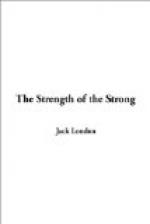It was a gloomy handful of men that came together at the club that morning. There was no service at all. The last servant was gone. I noticed, too, that the silver was gone, and I learned where it had gone. The servants had not taken it, for the reason, I presume, that the club members got to it first. Their method of disposing of it was simple. Down south of Market Street, in the dwellings of the I.L.W., the housewives had given square meals in exchange for it. I went back to my house. Yes, my silver was gone—all but a massive pitcher. This I wrapped up and carried down south of Market Street.
I felt better after the meal, and returned to the club to learn if there was anything new in the situation. Hanover, Collins, and Dakon were just leaving. There was no one inside, they told me, and they invited me to come along with them. They were leaving the city, they said, on Dakon’s horses, and there was a spare one for me. Dakon had four magnificent carriage horses that he wanted to save, and General Folsom had given him the tip that next morning all the horses that remained in the city were to be confiscated for food. There were not many horses left, for tens of thousands of them had been turned loose into the country when the hay and grain gave out during the first days. Birdall, I remember, who had great draying interests, had turned loose three hundred dray horses. At an average value of five hundred dollars, this had amounted to $150,000. He had hoped, at first, to recover most of the horses after the strike was over, but in the end he never recovered one of them. They were all eaten by the people that fled from San Francisco. For that matter, the killing of the army mules and horses for food had already begun.
Fortunately for Dakon, he had had a plentiful supply of hay and grain stored in his stable. We managed to raise four saddles, and we found the animals in good condition and spirited, withal unused to being ridden. I remembered the San Francisco of the great earthquake as we rode through the streets, but this San Francisco was vastly more pitiable. No cataclysm of nature had caused this, but, rather, the tyranny of the labour unions. We rode down past Union Square and through the theatre, hotel, and shopping districts. The streets were deserted. Here and there stood automobiles, abandoned where they had broken down or when the gasolene had given out. There was no sign of life, save for the




